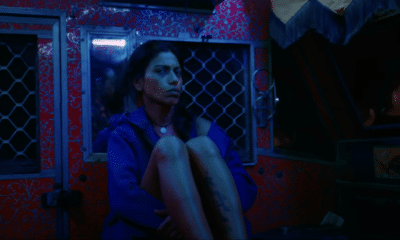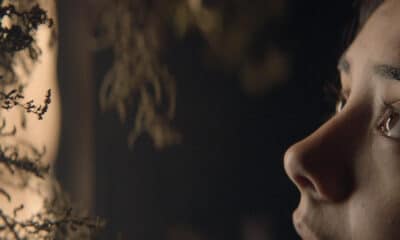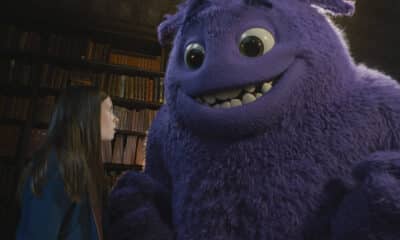 A good TV dad is there to dole out lessons. Whether he’s a Cosby-esque dispenser of wisdom or a bad influence who we don’t want to emulate, a TV dad can pass on his years of fictional wisdom to the millions of viewers at home. Equally valuable is the non-related father figure; a boss, perhaps, or a grumpy but loveable teacher. Without their guidance, our favourite characters would lack the support needed to get through their many challenges, and therefore the TV shows we love would be much, much shorter.
A good TV dad is there to dole out lessons. Whether he’s a Cosby-esque dispenser of wisdom or a bad influence who we don’t want to emulate, a TV dad can pass on his years of fictional wisdom to the millions of viewers at home. Equally valuable is the non-related father figure; a boss, perhaps, or a grumpy but loveable teacher. Without their guidance, our favourite characters would lack the support needed to get through their many challenges, and therefore the TV shows we love would be much, much shorter.
Five Great TV Dads & Father Figures:
Martin Crane, FRASIER (1993 – 2004)
 The Disappointed Father is a common trope. From FRIDAY NIGHT LIGHTS to THE WIRE, sons have failed to meet expectations since storytelling began. Perhaps they can’t live up to their father’s legacy in a chosen field, or their dads just see them as spoiled, lazy gadabouts who do nothing but waste time. In the case of FRASIER, though, Martin Crane’s (John Mahoney) disappointment stemmed from his sons’ intelligence, intellectualism and career success. Frasier Crane was introduced in the smash hit CHEERS, where his book smarts and windbaggery provided a sharp contrast to the generally oafish patrons of the bar. With his spinoff, though, he was on his home turf, his wordplay and self satisfied wit playing better to Seattle’s coffee houses than Boston’s boozers. But Frasier Crane needs a foil, a sharp tongue to keep his ego in check, and who better than his grouchy, down to earth, ex-cop father? In the pilot episode, Frasier’s grand plans for a fresh start in Seattle are disrupted by Martin, whose worsening physical condition makes him incapable of self sufficiency. This wacky, odd couple-esque set up is fraught with tension from the get go; Frasier can’t tolerate his father’s beer swilling, ugly chair and annoying dog having ways, and in turn Martin is rankled by his son’s sherry sipping pomposity. But just as Seattle is a fresh start for Frasier, it is also a new beginning for his relationship with his father, from whom he and his even more effete brother Niles were always distant. Once they settle into their less-than-ideal living conditions, they are able to finally build up the bond they never really had in years gone by. The relationship becomes less about a culture clash and more making up for lost time, before finally settling into a comfortable familiarity. Ultimately, as the show begins to spend less time on Frasier/Martin and more on Frasier/Niles, Martin plays the part of the Greek Chorus, commenting on the needless complexity of the brothers’ farcical schemes, and providing a sounding board for them to discuss life’s troubles.
The Disappointed Father is a common trope. From FRIDAY NIGHT LIGHTS to THE WIRE, sons have failed to meet expectations since storytelling began. Perhaps they can’t live up to their father’s legacy in a chosen field, or their dads just see them as spoiled, lazy gadabouts who do nothing but waste time. In the case of FRASIER, though, Martin Crane’s (John Mahoney) disappointment stemmed from his sons’ intelligence, intellectualism and career success. Frasier Crane was introduced in the smash hit CHEERS, where his book smarts and windbaggery provided a sharp contrast to the generally oafish patrons of the bar. With his spinoff, though, he was on his home turf, his wordplay and self satisfied wit playing better to Seattle’s coffee houses than Boston’s boozers. But Frasier Crane needs a foil, a sharp tongue to keep his ego in check, and who better than his grouchy, down to earth, ex-cop father? In the pilot episode, Frasier’s grand plans for a fresh start in Seattle are disrupted by Martin, whose worsening physical condition makes him incapable of self sufficiency. This wacky, odd couple-esque set up is fraught with tension from the get go; Frasier can’t tolerate his father’s beer swilling, ugly chair and annoying dog having ways, and in turn Martin is rankled by his son’s sherry sipping pomposity. But just as Seattle is a fresh start for Frasier, it is also a new beginning for his relationship with his father, from whom he and his even more effete brother Niles were always distant. Once they settle into their less-than-ideal living conditions, they are able to finally build up the bond they never really had in years gone by. The relationship becomes less about a culture clash and more making up for lost time, before finally settling into a comfortable familiarity. Ultimately, as the show begins to spend less time on Frasier/Martin and more on Frasier/Niles, Martin plays the part of the Greek Chorus, commenting on the needless complexity of the brothers’ farcical schemes, and providing a sounding board for them to discuss life’s troubles.
Rupert Giles, BUFFY THE VAMPIRE SLAYER (1997 – 2003)
 In the BUFFY universe, more often than not, parents fail their children. Buffy’s father is written off to a life of philandering with his secretary. Xander’s parents are violent drunks whose fights send him to a self imposed Christmas in the garden. Willow’s folks aren’t quite so extreme, but seem unreasonably strict, and Spike’s Victorian era mother has… well, some serious issues. But the youth of the Buffyverse need look no further than their school library for a father figure, in the form of reserved, stuffy Englishman Rupert Giles (Anthony Stewart Head). His paternal role is seen most clearly in his relationship with Buffy; as her watcher, his duty is to ensure that she is prepared to fight the endless stream of monsters that plague the town of Sunnydale, but they quickly become far closer than their professional connection should allow. Indeed, his fatherly love for his charge is at times a hindrance to the fight against evil, as it becomes difficult to send Buffy into situations wherein she could easily meet her doom. Giles is above all a pragmatist, though, and sees the world in shades of gray, as opposed to Buffy’s pure heroism. With his years of wisdom and elements of world weariness, he is able to commit certain (necessary) deeds that Buffy herself simply can’t. The surrogate parent/child relationship evolves over the years, most notably in season four, with Buffy’s move to college and growing independence. While she meets new people and expands her view of the world, he undergoes something of a midlife crisis, feeling somewhat superfluous. But it is in these later years that the relationship truly matures. Whereas in the early years Giles often functioned as a source of exposition, telling the gang about that week’s monster and how they might defeat it, he becomes a true role model, connecting to the now-grown up characters as adults but always available for support and fatherly advice.
In the BUFFY universe, more often than not, parents fail their children. Buffy’s father is written off to a life of philandering with his secretary. Xander’s parents are violent drunks whose fights send him to a self imposed Christmas in the garden. Willow’s folks aren’t quite so extreme, but seem unreasonably strict, and Spike’s Victorian era mother has… well, some serious issues. But the youth of the Buffyverse need look no further than their school library for a father figure, in the form of reserved, stuffy Englishman Rupert Giles (Anthony Stewart Head). His paternal role is seen most clearly in his relationship with Buffy; as her watcher, his duty is to ensure that she is prepared to fight the endless stream of monsters that plague the town of Sunnydale, but they quickly become far closer than their professional connection should allow. Indeed, his fatherly love for his charge is at times a hindrance to the fight against evil, as it becomes difficult to send Buffy into situations wherein she could easily meet her doom. Giles is above all a pragmatist, though, and sees the world in shades of gray, as opposed to Buffy’s pure heroism. With his years of wisdom and elements of world weariness, he is able to commit certain (necessary) deeds that Buffy herself simply can’t. The surrogate parent/child relationship evolves over the years, most notably in season four, with Buffy’s move to college and growing independence. While she meets new people and expands her view of the world, he undergoes something of a midlife crisis, feeling somewhat superfluous. But it is in these later years that the relationship truly matures. Whereas in the early years Giles often functioned as a source of exposition, telling the gang about that week’s monster and how they might defeat it, he becomes a true role model, connecting to the now-grown up characters as adults but always available for support and fatherly advice.
Tony Soprano, THE SOPRANOS (1999 – 2007)
 There’s no denying that Tony Soprano (James Gandolfini) is a bad guy. When he’s not out committing crimes, he’s planning future crimes, or puzzling over how to improve his criminal organisation. He’s an adulterer, a murderer, a force of destructive energy. He’s also (when it suits him) a loving father. Regardless of his means, it must be said that Tony Soprano always keeps food on the table and a roof over his kids’ heads. That’s not to say he is by any stretch a terrific father – an awkwardly hilarious moment with daughter Meadow’s mixed race boyfriend springs to mind – but it is clear he will do anything for his children. With his son AJ, he plays both the pally dad and authoritative father figure, often within the same episode, treating his ne’er-do-well offspring to a ludicrous car one moment, smashing its windows to prove a point the next. He’s protective of his daughter to the point of raising his fists to a Made Man (never a good idea), even if her college liberalism will always provoke a shouting match between the two. His intentions are noble, though: he doesn’t want them in The Life. Tony followed his gangster father into the mob, and though crime haspaid for him, he’s seen the ugly sides too. And he has a walking reminder of the toll crime can take in the form of his nephew Christopher, to whom he is something of a surrogate father. Over the years, Tony does everything he can to keep Christopher on the straight and narrow (or the mafia version thereof), even as his protégé does everything in his power to screw it up. Fitting for a man as greedy as Tony, he has his cake and eats it too: the ivy league, pre-med daughter and the heir to the throne nephew. Tony nurtures as best he can, having been raised by a regularly absent father and a mother truly twisted by hate. Through Meadow and AJ, we see that not all of his deeds are purely selfish, that he has a few shreds of decency left over.
There’s no denying that Tony Soprano (James Gandolfini) is a bad guy. When he’s not out committing crimes, he’s planning future crimes, or puzzling over how to improve his criminal organisation. He’s an adulterer, a murderer, a force of destructive energy. He’s also (when it suits him) a loving father. Regardless of his means, it must be said that Tony Soprano always keeps food on the table and a roof over his kids’ heads. That’s not to say he is by any stretch a terrific father – an awkwardly hilarious moment with daughter Meadow’s mixed race boyfriend springs to mind – but it is clear he will do anything for his children. With his son AJ, he plays both the pally dad and authoritative father figure, often within the same episode, treating his ne’er-do-well offspring to a ludicrous car one moment, smashing its windows to prove a point the next. He’s protective of his daughter to the point of raising his fists to a Made Man (never a good idea), even if her college liberalism will always provoke a shouting match between the two. His intentions are noble, though: he doesn’t want them in The Life. Tony followed his gangster father into the mob, and though crime haspaid for him, he’s seen the ugly sides too. And he has a walking reminder of the toll crime can take in the form of his nephew Christopher, to whom he is something of a surrogate father. Over the years, Tony does everything he can to keep Christopher on the straight and narrow (or the mafia version thereof), even as his protégé does everything in his power to screw it up. Fitting for a man as greedy as Tony, he has his cake and eats it too: the ivy league, pre-med daughter and the heir to the throne nephew. Tony nurtures as best he can, having been raised by a regularly absent father and a mother truly twisted by hate. Through Meadow and AJ, we see that not all of his deeds are purely selfish, that he has a few shreds of decency left over.
Ron Swanson, PARKS AND RECREATION (2009 – )
 During PARKS AND RECREATION’s shaky first couple of episodes, Ron Swanson came to life immediately. A capital m Man, Swanson spends the majority of the show’s early days gruffly dismissing Leslie Knope’s enthusiasm and slam dunking an endless stream of misanthropic lines (it helps that, with his terrific moustache and stoicism, he’s almost a human comic strip character). In the context of that brief first season, his disdain for government work, or government in general, made him come across as something of an antagonist for the not-quite-there characterisation of Leslie Knope. But when the second season rolled around, neatening up the show’s rough edges, Ron made the switch from combative grouch to heroic, problem solving patriarch, albeit one who maintained his fiercely libertarian, privacy protecting, aggressively distant persona. His fatherly side is strongest in his treatment of resident goofball Andy Dwyer. At first he enjoys Andy’s company simply as another red meat and sports-enjoying male in an office populated mostly by women, and the foppish Tom Haverford. Over time, though, Ron’s heavily fortified personal boundaries break down in the face of Andy’s sheer exuberance. Against his better judgement, he helps Andy through many personal crises, elevating the life of a man who spent a decent amount of time living in a pit. Similarly, his relationship with Leslie matures and refines itself over the years; as a close bond forms between the two, he treats her as a confidant and does everything he can (be bothered to do) to help her. It’s genuine development for a man who makes a conscious effort not to change.
During PARKS AND RECREATION’s shaky first couple of episodes, Ron Swanson came to life immediately. A capital m Man, Swanson spends the majority of the show’s early days gruffly dismissing Leslie Knope’s enthusiasm and slam dunking an endless stream of misanthropic lines (it helps that, with his terrific moustache and stoicism, he’s almost a human comic strip character). In the context of that brief first season, his disdain for government work, or government in general, made him come across as something of an antagonist for the not-quite-there characterisation of Leslie Knope. But when the second season rolled around, neatening up the show’s rough edges, Ron made the switch from combative grouch to heroic, problem solving patriarch, albeit one who maintained his fiercely libertarian, privacy protecting, aggressively distant persona. His fatherly side is strongest in his treatment of resident goofball Andy Dwyer. At first he enjoys Andy’s company simply as another red meat and sports-enjoying male in an office populated mostly by women, and the foppish Tom Haverford. Over time, though, Ron’s heavily fortified personal boundaries break down in the face of Andy’s sheer exuberance. Against his better judgement, he helps Andy through many personal crises, elevating the life of a man who spent a decent amount of time living in a pit. Similarly, his relationship with Leslie matures and refines itself over the years; as a close bond forms between the two, he treats her as a confidant and does everything he can (be bothered to do) to help her. It’s genuine development for a man who makes a conscious effort not to change.
Hugh Tazmanian Devil, TAZMANIA (1991 – 1993)
 Taking responsibility for a superpowered teen or a spoiled mafia princess is hard enough. Keeping your patience with an aggravating egghead or accident prone dofus poses its own set of challenges. But providing for a literal whirling dervish, an appetite on legs that thinks only of eating, comic books, and spinning round really fast is nigh on impossible. Respect, therefore, must be given to Hugh Tazmanian Devil, father to Taz (and two other relatively inconsequential children), arguably Looney Tunes’ most maniacal creation. Taz’s dad is essentially the acme of TV fathers. He likes reading the newspaper, golf and orange juice. He dispenses life lessons from the comfort of his easy chair, rhapsodising on manhood, responsibility and the benefits of OJ to a nutritious breakfast. So classic and well worn are his homespun truths that he needn’t even waste time getting all the way through them, choosing instead to take a tangent into blah blah blahs and yackity schmackitys when he thinks his boisterous son has the gist. Hugh Tazmanian Devil embodies all the best qualities of a TV dad. He’s easy going, a firm believer in the Boys Will Be Boys school of parenting, but willing to intervene when Taz’s antics go a shade too far, or more frequently, put him off the leisure activity he’s engaged in. He needs only the simple things: family, OJ, and a little peace and quiet. Brought to life by the Welles-ian tones of Maurice LaMarche, he is perhaps the only calming influence in all of Tazmania. He’s a reminder of a bygone era, encouraging his endlessly energetic son to take a step back and enjoy life at a slower pace, preferably with a tall glass of OJ on hand.
Taking responsibility for a superpowered teen or a spoiled mafia princess is hard enough. Keeping your patience with an aggravating egghead or accident prone dofus poses its own set of challenges. But providing for a literal whirling dervish, an appetite on legs that thinks only of eating, comic books, and spinning round really fast is nigh on impossible. Respect, therefore, must be given to Hugh Tazmanian Devil, father to Taz (and two other relatively inconsequential children), arguably Looney Tunes’ most maniacal creation. Taz’s dad is essentially the acme of TV fathers. He likes reading the newspaper, golf and orange juice. He dispenses life lessons from the comfort of his easy chair, rhapsodising on manhood, responsibility and the benefits of OJ to a nutritious breakfast. So classic and well worn are his homespun truths that he needn’t even waste time getting all the way through them, choosing instead to take a tangent into blah blah blahs and yackity schmackitys when he thinks his boisterous son has the gist. Hugh Tazmanian Devil embodies all the best qualities of a TV dad. He’s easy going, a firm believer in the Boys Will Be Boys school of parenting, but willing to intervene when Taz’s antics go a shade too far, or more frequently, put him off the leisure activity he’s engaged in. He needs only the simple things: family, OJ, and a little peace and quiet. Brought to life by the Welles-ian tones of Maurice LaMarche, he is perhaps the only calming influence in all of Tazmania. He’s a reminder of a bygone era, encouraging his endlessly energetic son to take a step back and enjoy life at a slower pace, preferably with a tall glass of OJ on hand.
And one not so good one…
Clay Puppington, MORAL OREL (2005 – 2008)
 The job of a TV dad is to nurture, to help a younger member of society through life, showing the way forward, the difference between right and wrong. Clay Puppington, one of the central characters of Adult Swim’s incredible MORAL OREL, not only fails to do these things, but actively spits in the face of any model of good fatherhood. Orel Puppington, the twelve year old protagonist of the show, looks up to his father for life lessons, to make some sense of the world around him. In a town full of ludicrously religious folk, Orel is the most devout; the formulaic (though still very funny) first season mostly consists of Orel misinterpreting a sermon, causing no end of chaos, then receiving punishment from his father, usually for very much the wrong reason (after reanimating corpses in the first episode, he’s punished not for raising the dead but for allowing the dead to stroll around naked). In season two, the show widens its parameters, examining the whole town of Moralton and taking the focus off the cycle of abuse in the Puppington family… briefly. Towards the end of the season, Orel and his father go on a hunting trip, and the show essentially becomes the darkest thing you’ll see. Season three makes RAGING BULL look like THE PRINCESS BRIDE, and this is mostly due to its use of Clay Puppington, who more or less assumes main character status. Throughout the series, Clay has been drunk, violent and distant. In season three, his character is dissected and examined; the source of his monstrosity is displayed, even as his behaviour becomes even worse. In some hidden corner of his being, Clay has some love for his son; it’s just buried under layers of self loathing, frustration and booze.
The job of a TV dad is to nurture, to help a younger member of society through life, showing the way forward, the difference between right and wrong. Clay Puppington, one of the central characters of Adult Swim’s incredible MORAL OREL, not only fails to do these things, but actively spits in the face of any model of good fatherhood. Orel Puppington, the twelve year old protagonist of the show, looks up to his father for life lessons, to make some sense of the world around him. In a town full of ludicrously religious folk, Orel is the most devout; the formulaic (though still very funny) first season mostly consists of Orel misinterpreting a sermon, causing no end of chaos, then receiving punishment from his father, usually for very much the wrong reason (after reanimating corpses in the first episode, he’s punished not for raising the dead but for allowing the dead to stroll around naked). In season two, the show widens its parameters, examining the whole town of Moralton and taking the focus off the cycle of abuse in the Puppington family… briefly. Towards the end of the season, Orel and his father go on a hunting trip, and the show essentially becomes the darkest thing you’ll see. Season three makes RAGING BULL look like THE PRINCESS BRIDE, and this is mostly due to its use of Clay Puppington, who more or less assumes main character status. Throughout the series, Clay has been drunk, violent and distant. In season three, his character is dissected and examined; the source of his monstrosity is displayed, even as his behaviour becomes even worse. In some hidden corner of his being, Clay has some love for his son; it’s just buried under layers of self loathing, frustration and booze.

Latest Posts
-


Film Trailers
/ 9 hours agoFestival trailer for ‘The Shameless’ which will premiere in Cannes
A trailer has dropped for The Shameless, a new film set to arrive on...
By Paul Heath -


Film Trailers
/ 11 hours agoTrailer for folk horror ‘Sorcery’ – new film set for summer release
A trailer has landed for the new folk horror Sorcery which is set to...
By Paul Heath -


Film News
/ 13 hours agoNew featurette for John Krasinski’s ‘IF’ film
Ahead of its coming premiere on screens in cinemas a new behind the scenes...
By Paul Heath -


Film Trailers
/ 13 hours agoFirst trailer arrives for ‘Mufasa: The Lion King’
Coming to cinemas this Christmas.
By Paul Heath















